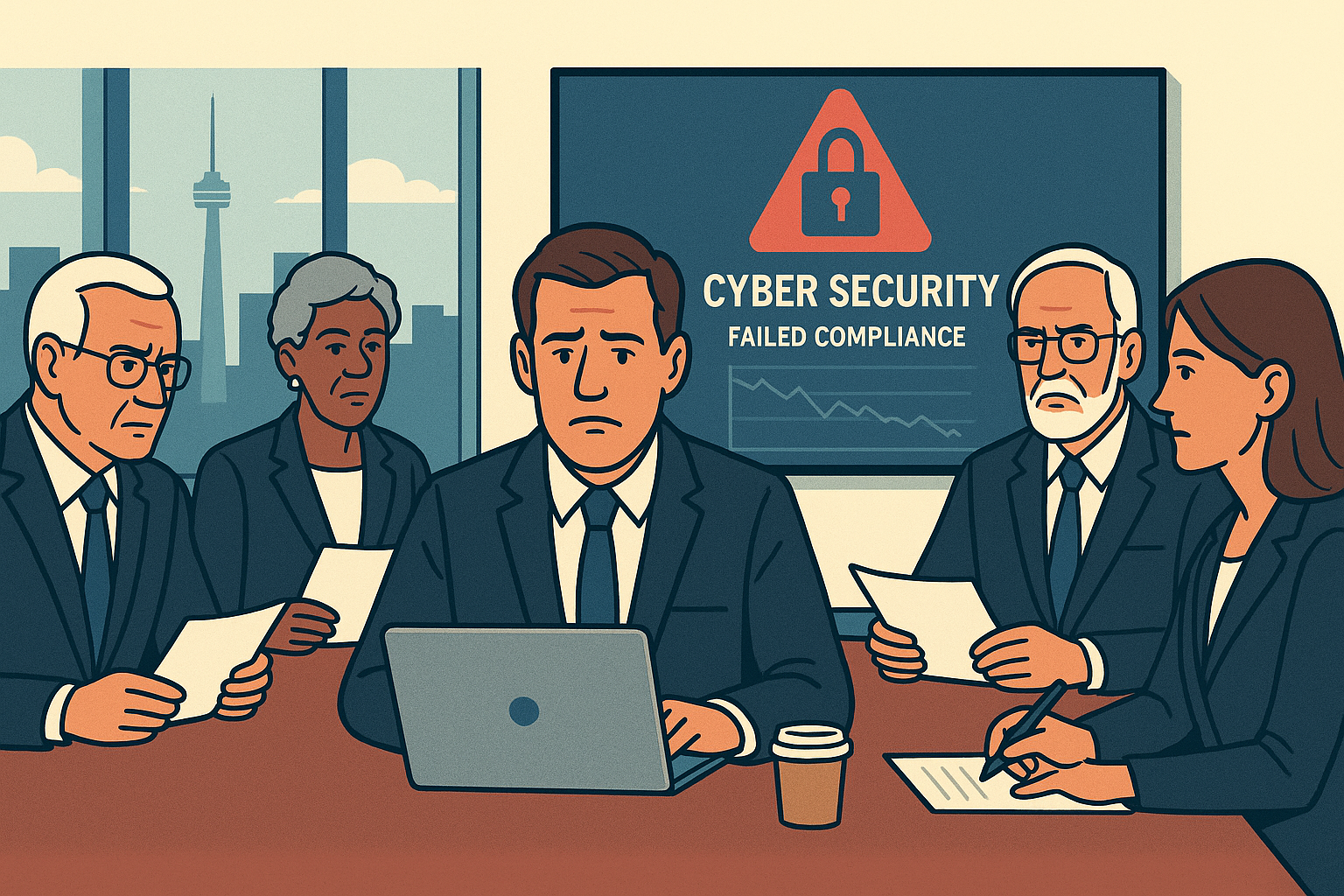Toronto-Based Holding Company Faces Board Scrutiny After Failing to Meet New Federal Cyber Compliance Standards
The Challenge
Northport Holdings Inc., a mid-sized Toronto-based holding company with subsidiaries in logistics, retail, and professional services, ran into trouble after new federal cybersecurity compliance expectations took effect. The firm’s decentralized governance left data protection responsibilities scattered across business units, which created gaps in oversight and control.
An internal review tied to a cyber-insurance renewal uncovered multiple weaknesses. Privileged accounts were not protected by multi-factor authentication. Dormant user accounts remained active in a legacy system. A marketing vendor retained access beyond the contract’s term. Data mapping also revealed interprovincial transfers of personal information without clear consent tracking. Under PIPEDA’s accountability principle, Northport was responsible for all personal information handled by its subsidiaries and service providers.
The consequences escalated quickly. The insurer warned of higher premiums until controls improved. A key retail partner paused its contract renewal pending assurance of compliance. Lenders raised questions about the firm’s risk management practices. Board directors came to understand that their fiduciary oversight included cyber governance and that past deferrals of investment had left the organization exposed. What began as a compliance gap became a governance crisis with immediate operational, financial, and reputational impacts.
Our Solution
Our Risk and Compliance Governance team led a structured program to restore regulatory confidence and establish durable compliance under PIPEDA and evolving federal expectations.
Key actions delivered:
- Enterprise-wide governance framework: Implemented a centralized cyber and privacy policy applicable to all subsidiaries, with clear roles, responsibilities, and reporting lines.
- Compliance audit and data flow mapping: Assessed PIPEDA alignment, documented data inventories, identified cross-border and interprovincial transfers, and validated consent mechanisms.
- Identity and access controls: Enforced multi-factor authentication for all administrative accounts, standardized joiner-mover-leaver processes, and eliminated legacy access.
- Third-party risk management: Introduced a formal vendor due diligence and contract assurance process, including security questionnaires, minimum control requirements, and monitoring.
- Board enablement: Delivered director-level sessions on legal obligations and established a quarterly cyber risk report integrated with the enterprise risk management program.
The Value
Within six months, Northport rebuilt trust with stakeholders and strengthened its security posture.
Measured outcomes: Beyond these metrics, leadership now treats cybersecurity as a core element of corporate governance. The company is better positioned to maintain stakeholder confidence, support growth initiatives, and respond quickly to regulatory inquiries.
- Achieved full alignment with internal PIPEDA audit criteria across all subsidiaries.
- Reduced the insurer’s proposed premium increase by 45 percent after revalidation.
- Cut partner assurance response time from four weeks to five days.
- Closed all critical and high findings identified in the initial audit, with zero nonconformities in an external follow-up.
- Implemented quarterly board reporting and a real-time risk dashboard for executive oversight.
Implementation Roadmap
Phase 1: Discovery and Assessment (Weeks 1 to 4) Phase 2: Framework Design (Weeks 5 to 8) Phase 3: Control Implementation (Weeks 9 to 16) Phase 4: Board and Leadership Enablement (Weeks 17 to 20) Phase 5: Validation and Continuous Improvement (Weeks 21 to 24)
- Conducted a maturity assessment of governance, risk, and compliance.
- Mapped data flows and identified accountability gaps across subsidiaries.
- Drafted a unified cyber governance charter and operating model.
- Harmonized core policies, standards, and subsidiary procedures.
- Rolled out multi-factor authentication, least privilege access, and standardized offboarding.
- Deployed a vendor risk program with due diligence, contract clauses, and monitoring.
- Delivered training on PIPEDA obligations and director responsibilities.
- Introduced cyber KPIs and integrated cyber risk into the ERM dashboard.
- Completed a post-implementation compliance audit and readiness review.
- Scheduled ongoing audits, tabletop exercises, and continuous monitoring.


